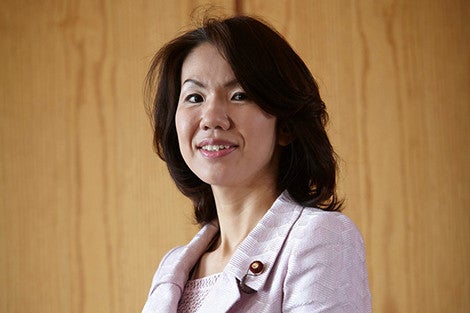August 19, 2014 — When she was running for a seat in Japan’s house of representatives, Mayuko Toyota, SM ’02, one day found herself standing in the rain on crutches, giving a speech at a common venue for politicking in that country: outside the train station in her legislative district.
“I might have looked miserable,” she said, explaining that an injury had her hobbling around for three months during her campaign. It was already challenging enough running for office without a fortune or family connections, and with two toddlers at home.
Still, Toyota was optimistic about her prospects. “I don’t know the reason,” she said, “but I never imagined that I would lose.”
A member of the Liberal Democratic Party, she was among a wave of relative unknowns who got elected to the house in 2012 after Japan simplified the system by which candidates enter the electoral process. The change opened the door to many people like Toyota—educated professionals outside the establishment who were willing to knock on doors and win over voters with the power of their ideas.
During a recent visit to Boston, Toyota discussed her trailblazing career from bureaucrat to Harvard School of Public Health student to diplomat to politician. She had come to the United States with a delegation of fellow Japanese legislators involved in a parliamentary exchange with members of Congress.
Toyota began her career in Japan’s Ministry of Health, Labor and Welfare after earning a degree in public law at the University of Tokyo. She led the implementation of a supplemental health insurance program for seniors in order to address one of her country’s primary public health issues—caring for an aging populace without going broke.
During her time in the ministry, Toyota saw a need for greater emphasis on evidence-based policymaking. So she secured government sponsorship to attend HSPH and earn a master’s degree in public health policy.
The quality of the faculty and educational environment at HSPH appealed to her. “I learned epidemiology and statistics and financial management, and how to utilize these things in public health,” she said. “It was a wonderful and very new experience for me.”
Toyota’s interactions with students from many different countries opened her eyes to global issues that don’t get much consideration in Japan. “In general, the Japanese people are very internal,” she said. At HSPH she observed that “public health people have a mind to contribute to the world.”
A few years after returning to work at the ministry, Toyota was dispatched to the Permanent Mission of Japan to the United Nations and Other International Organizations in Geneva in 2007. She was first secretary in charge of the World Health Organization during responses to H1N1 influenza (“swine flu”), which caused a worldwide pandemic in 2009. H1N1 turned out to be relatively mild, but at the time, recalled Toyota, “we imagined the outbreak of a terrible virus.”
The WHO faced the delicate balancing act of warning the public of the potential dangers of the virus, getting treatment to countries in need, and avoiding panic. The organization was criticized for its handling of the situation. That episode, said Toyota, served as a lesson in diplomacy and, more important, how to strengthen the system of international response to pandemics.
When the Tohoku earthquake and tsunamis, and the ensuing nuclear accident at the Fukushima power plant, hit Japan in 2011, Toyota was working in the health ministry’s department of elder services. A few months after the tragedy, she was tasked with helping elderly survivors find housing, medical care, and community support. As a politician, she has continued to visit Tohoku “to hear people’s voices, to let them know that ‘we will never forget you.’”
Michael Reich, HSPH’s Taro Takemi Professor of International Health Policy and a mentor to Toyota, pointed out that she is among only a few graduates of the school who have entered politics as a profession.
“I think that there’s a need for people in public health, including our students, to understand that politicians have an important role in shaping policy, and that politicians with public health training can make an important contribution,” he said.
Now that she has begun her career as a political leader, Toyota said, “I have to continue to run for election, and I have to succeed in order to have more influence in politics—not for me, but for the Japanese people.”
While she stresses that her responsibilities are now much broader than they were at the ministry, public health issues—in Japan and worldwide—remain a “first priority” for her. Among the members of both houses of the Japanese parliament, Toyota is one of only three with a background in public health.
“So I’m very rare,” she said. “I have to utilize my experience.”
